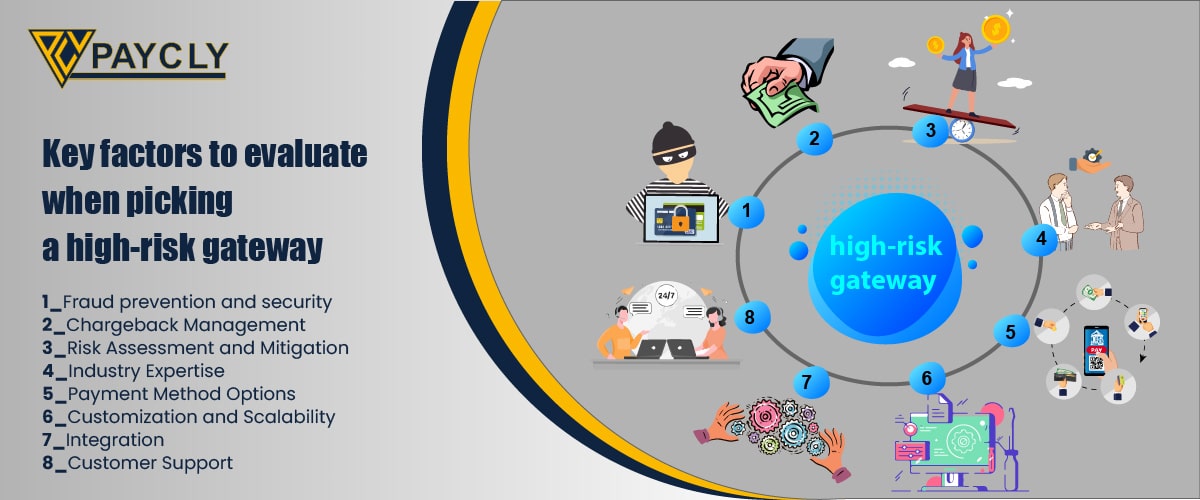In modern times, technological advancements have changed the norms of the business world. Now every business is tech-centric and operates primarily via online channels. Because of this, online payment solution providers, or payment gateways, nowadays have a significant place in business operations. Due to their ability to process online payments in a safer and faster manner, payment gateways have become an integrated part of the modern business landscape. But as we know, everything has its limitations. The usual or low-risk payment gateways also have a ceiling that they can't breach. Hence, they are not appropriate to be used by every kind of business. But high-risk gateways are equally opposite from their counterparts, as they can provide services to almost every type of business, especially high-risk ones
High-risk industries are those businesses that present a lot of difficulties to payment processors. Therefore, need such online payment solution providers that could provide tailored solutions for the unique challenges of high-risk businesses. Despite their proficiency in high-risk businesses, high-risk gateways could be the best online payment solutions for any business, which brings us to the focal point of this blog, which is how merchants can make their way to success in their business by utilizing a high-risk payment gateway. So, if you want to know how a high-risk payment gateway can uplift your business operations, be with us till the end.
High-risk gateways offer distinct advantages when it comes to providing online payment processing solutions, particularly for businesses operating in industries with higher risk factors. Here are some reasons why high-risk gateways could be preferred over usual payment gateways:
Risk Management: High-risk gateways are equipped with many advanced risk management tools and technologies to identify and mitigate fraudulent activities and chargebacks. They employ sophisticated fraud detection systems and real-time monitoring to minimize the impact of potential risks.
Flexible Approval Criteria: High-risk gateways are more likely to approve businesses that might be considered too risky by traditional payment gateways. This inclusivity allows businesses with legitimate offerings in high-risk industries to access payment processing services they might otherwise be denied.
Chargeback Prevention: High-risk gateways offer chargeback prevention mechanisms and dispute resolution assistance, helping businesses reduce the occurrence of chargebacks and the associated financial losses.
Customized Solutions: High-risk gateways provide solutions tailored to the specific needs of businesses, such as recurring billing, multi-currency support, and international payment options, which are essential for businesses operating in overseas markets.
Regulatory Compliance: High-risk gateways are well-versed in industry-specific regulations and compliance requirements. They help businesses navigate complex legal landscapes, reducing the risk of non-compliance and associated penalties.
Data Security: High-risk gateways prioritize data security and therefore employ robust security protocols such as encryption, 3D secure transactions, and PCI DSS compliance to protect sensitive customer information of the businesses and their customers.
Here are some essential factors you should examine before partnering with a high-risk payment gateway:

By carefully evaluating these points, you can make an informed decision when selecting a high-risk gateway that aligns with your business's requirements and contributes to its success and growth.
If you are in search of the best high-risk payment processing solutions for your business, you have to consider a payment gateway that can align with your business requirements. And for this, you can check some important points in the high-risk payment gateway mentioned earlier in this blog before finalizing any payment processor. However, it is a colossal task to find the most suitable online payment solution provider among the limitless ocean of options on the market. But you don't have to worry about that, as you can opt for PAYCLY, one of the best high-risk payment gateway providers. PAYCLY is a well-known and established online payment solutions provider that provides numerous benefits to merchants.

Getting a high-risk gateway account involves several steps. Here's a general process to guide you:
This is how you can get a high-risk gateway account.
A high-risk gateway services account refers to a specialized payment processing solution designed to serve businesses operating in industries with elevated risk factors. These industries are often deemed "high-risk" due to factors such as a higher likelihood of chargebacks, fraud, regulatory complexities, or reputational risks. A high-risk gateway service account enables these businesses to securely process online payments while managing the associated challenges and risks.
The cost of a high-risk gateway account can vary significantly based on several factors, including the provider you choose, the specific services and features included, your industry, transaction volume, and the level of risk associated with your business. High-risk gateway account costs can include various fees, both one-time and ongoing.
Opening a high-risk gateway account is a pretty simple task; you just have to follow the given instructions here:
By following these guidelines, you can easily open a high-risk gateway account.
Transferring money from a high-risk gateway account to your bank account follows a similar process as transferring funds from any payment gateway. There is no other, additional, or different procedure for this.